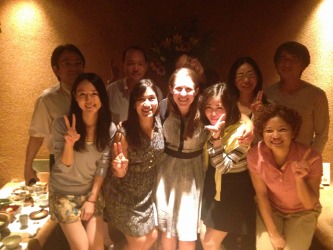Clinical Exchange in Japan
Welcome to Japan and Nagoya University school of Medicine!
Experience Report
Samantha Parker from Tulane University, USA
Preriod:2015/4/1-4/30
I decided to apply for medical rotations after meeting the many Japanese medical students who rotated at Tulane University School of Medicine. I was intrigued by the nuanced cultural and educational differences they described and I decided to apply. I had an extremely rich educational experience while rotating at Nagoya University School of Medicine. I was struck by the kindness of my teachers and fellow students and by the similarities and differences between medical practice in the United States and Japan. It was challenging for me to learn medicine in a new language and culture, and I was lucky to have patient professors to guide me.
As a student in the pathology department, my daily routine included gross section in the morning followed by a group discussion of recent slides. In the afternoon I had the opportunity to self-study and then review slides of my own interest. This was quite possibly my first experience in medical school where I was given responsibility for directing my own education. As I am interested in hematology and oncology, I chose to study lymphomas and solid tumors. I was fortunate to have many junior faculty interested in these fields who told me about their research and guided me through many slides. I found the apprenticeship aspect of Japanese medical student to be most apparent in these relationships. Unlike in American medical education, I felt these educators took personal responsibility for my learning. In addition, I felt that teaching was a valued aspect of their medical training and professional development. I plan to emulate their patience and enthusiasm for teaching throughout my medical career.
Similarly, as a student on the Hematology service, the faculty were enthusiastic to discuss their work and exchange ideas about medical practice in the US and Japan. I was lucky to work with physicians who were patient with my questions and lack of Japanese language skills. Even though I was unable to communicate with patients, I was able to understand their medical histories, lab results, pathology and imaging. Throughout the weeks I began to see a few nuanced differences between medical culture in the US and Japan. In particular, the amount of information given to patients about their illness differs between the countries. Similarly, patients in Japan stay much longer under observation in the hospital. I found these practices to be particularly interesting since they may impact patients’ lives significantly. However, the greater medical systems seem to be set up to allow for the differences and accommodate patients’ best interests in both situations. This experience will allow me to think critically in the future about the medical system in which I work. I hope to build upon this experience to develop greater insight to medical systems and their affect on patient care.
Rotating in Japan gave me the opportunity to learn about the practice of medicine in a different culture and to reflect on my own experiences in the United States. I believe it will be similarly enlightening to study in Japan during a more advanced phase of my training, and I hope to return to Nagoya University School of Medicine in the future. I also hope to share some insight into Japanese medical practice and culture with my classmates and friends in the United States. I am excited to meet more Japanese medical students who rotate at Tulane or at the University of Pennsylvania!

Click here to read other stories
Nagoya University Graduate School of Medicine